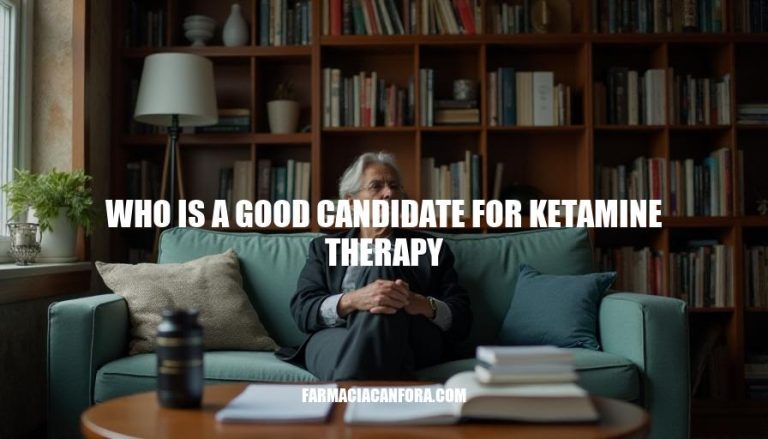


Ketamine therapy is an emerging treatment option for individuals with treatment-resistant depression, PTSD, and certain anxiety disorders. Ideal candidates are those who have not found relief with traditional therapies or medications. It’s crucial to understand eligibility criteria, as not everyone is suitable for this treatment. Factors such as overall physical health, absence of certain medical conditions (e.g., uncontrolled hypertension, history of psychosis), and a thorough psychiatric evaluation are essential to determine if ketamine therapy is appropriate. Consulting with a healthcare provider is the first step to ensure safe and effective treatment.
Individuals with treatment-resistant depression (TRD) are good candidates for ketamine therapy because they haven’t responded to traditional antidepressants. Ketamine can provide rapid relief for TRD, often within hours, unlike standard antidepressants which can take weeks.
Individuals diagnosed with major depressive disorder (MDD) who experience severe and persistent symptoms may be good candidates for ketamine therapy. This is particularly true for those with treatment-resistant depression (TRD), where traditional antidepressants and therapies have failed to provide relief.
Ketamine has shown rapid and significant antidepressant effects, often within hours of administration. This is crucial for patients with severe symptoms, as it can provide quick relief from debilitating depressive episodes. Additionally, ketamine’s effects can last for days to weeks, offering a respite from persistent symptoms.
For those with chronic and severe depression, ketamine therapy can be a valuable option, especially when other treatments have not been effective. The ability to alleviate symptoms quickly and sustain improvement makes it a promising treatment for those struggling with the severity and persistence of MDD.
Individuals with bipolar disorder, especially those who haven’t found relief with other treatments, might be considered good candidates for ketamine therapy for several reasons:
These factors make ketamine a promising option for managing bipolar depression.
Patients with PTSD can be good candidates for ketamine therapy for several reasons:
Treatment-Resistant Symptoms: Many patients with PTSD do not respond well to traditional treatments like SSRIs or psychotherapy. Ketamine has shown rapid antidepressant effects, making it a viable option for those who have exhausted other treatments.
Rapid Symptom Relief: Ketamine can provide quick relief from severe symptoms such as intense anxiety, depression, and suicidal ideation. This is particularly beneficial for patients in acute distress.
Chronic PTSD: Patients with chronic PTSD, especially those with symptoms stemming from childhood trauma, may find ketamine effective. These patients often experience symptoms that mimic depression, such as low self-esteem and negative thoughts.
Neurobiological Impact: Ketamine works differently from traditional antidepressants by targeting the NMDA receptors in the brain, which can help reset neural pathways associated with trauma and stress.
Comprehensive Treatment Plans: Ideal candidates are those willing to engage in a comprehensive treatment plan, including psychiatric evaluation and ongoing therapy, to maximize the benefits of ketamine.
By addressing these severe symptoms and providing rapid relief, ketamine therapy offers a promising alternative for patients with PTSD who have not found success with other treatments.
Psychiatric disorders that might make someone a good candidate for ketamine therapy include:
Eligibility criteria for ketamine therapy:
Here are the contraindications for ketamine therapy:
Ketamine therapy is an emerging treatment option for individuals with treatment-resistant depression, PTSD, and certain anxiety disorders. Ideal candidates are those who have not found relief with traditional therapies or medications.
To determine eligibility, factors such as overall physical health, absence of certain medical conditions, and a thorough psychiatric evaluation are essential. Consulting with a healthcare provider is the first step to ensure safe and effective treatment.
Individuals with treatment-resistant depression (TRD), major depressive disorder (MDD) with severe symptoms, and those who have not responded to traditional antidepressants may be good candidates for ketamine therapy. This treatment can provide rapid relief from debilitating depressive episodes, often within hours, and its effects can last for days to weeks.
Ketamine has also shown promise in treating bipolar disorder, particularly in reducing suicidal thoughts and promoting neuroplasticity. For patients with PTSD, ketamine can provide quick relief from severe symptoms such as intense anxiety, depression, and suicidal ideation.
Eligibility criteria for ketamine therapy include trying multiple medications and therapeutic interventions without significant relief, no contraindications such as uncontrolled hypertension or history of psychosis, and a thorough medical evaluation. Contraindications for ketamine therapy include active substance abuse, psychosis or schizophrenia, pregnancy, severe liver disease/failure, and certain other medical conditions.
Ultimately, determining who is a good candidate for ketamine therapy requires a comprehensive evaluation by a healthcare provider to ensure safe and effective treatment.